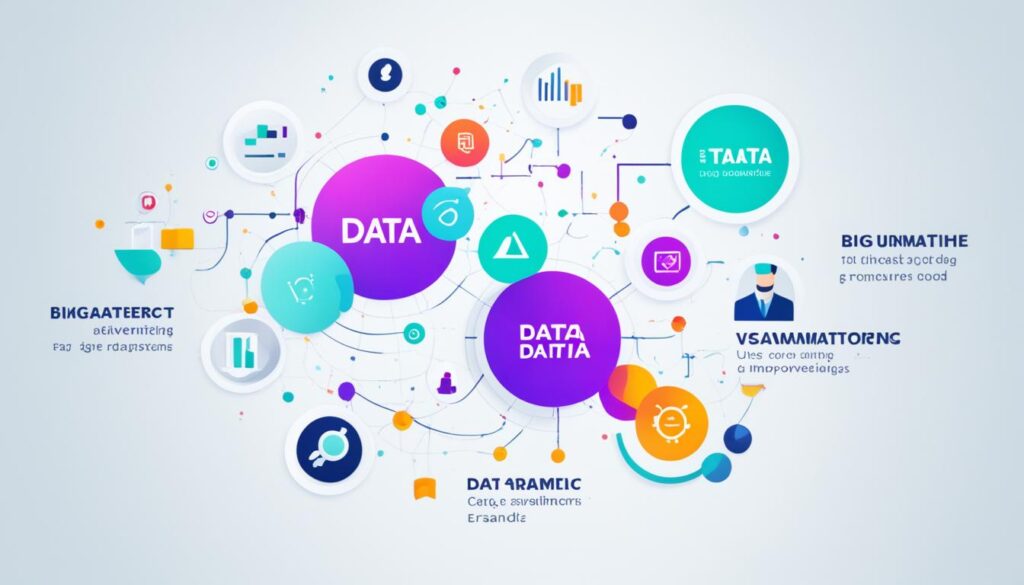In today’s rapidly evolving digital landscape, data-driven marketing has become the key to unlocking advertising success. With the advent of Big Data and programmatic advertising, marketers now have access to valuable insights and tools that enable them to optimize their ad campaigns, target the right audience, and stay ahead of digital advertising trends.
Big Data, in simple terms, refers to the immense volume of information generated through various online activities. By analyzing this data, marketers can uncover patterns, preferences, and behaviors that can drive more effective ad targeting strategies and campaign optimization.
Programmatic advertising, on the other hand, is the automated buying and selling of digital ad space. It allows advertisers to bid on ad placements in real time, based on their target audience and budget, resulting in more precise and cost-effective ad delivery.
When combined, Big Data and programmatic advertising offer significant benefits to marketers. From personalized ad experiences to real-time optimizations, this powerful duo enhances ad performance, reduces ad spend, and opens doors to new cross- and upselling opportunities.
Key Takeaways:
- Big Data enables marketers to harness valuable insights and make data-driven decisions for effective ad targeting strategies.
- Programmatic advertising automates the buying and selling of digital ad space, optimizing ad delivery and performance.
- A data-driven approach leads to improved ad campaign optimization and reduced ad spend.
- Personalized ad experiences resonate with customers, increasing engagement and conversion rates.
- Embracing Big Data and programmatic advertising allows marketers to stay ahead of digital advertising trends and drive ad success.
The Role of Big Data in Advertising
Big Data plays a crucial role in advertising, providing marketers with the ability to analyze and process large amounts of data for better ad campaign results. By leveraging Big Data, marketers can create personalized and targeted ad experiences based on individual preferences and behaviors.
One of the key advantages of Big Data in advertising is the use of targeting algorithms. These algorithms analyze vast data sets to identify patterns and behaviors, allowing marketers to pinpoint their target audience with precision. With targeted ads, brands can deliver personalized messages that resonate with customers and increase engagement and conversion rates.
To ensure effective ad campaigns, it’s essential for marketers to measure ad effectiveness metrics. By analyzing data on clicks, impressions, conversions, and other relevant metrics, marketers gain insights into what works and what doesn’t. This allows for data-driven decision-making and optimization of ad campaigns to maximize results.
Furthermore, Big Data enables the creation of personalized ad experiences. By understanding customer preferences, interests, and behaviors, marketers can tailor ad content to meet individual needs. Whether it’s product recommendations or relevant offers, personalized ad experiences enhance customer satisfaction and drive better campaign performance.
“Big Data provides marketers with valuable insights into customer behavior, enabling them to create highly targeted and personalized ad experiences that resonate with their audience.” – Marketing Expert
With Big Data and targeting algorithms, advertisers can optimize their ad campaigns for better reach and engagement. By analyzing ad effectiveness metrics, marketers can identify areas for improvement and make data-driven decisions. This not only enhances the overall performance of ad campaigns but also helps in reducing ad spend and maximizing return on investment.
Overall, Big Data empowers marketers with valuable insights and tools to create more effective and personalized ad experiences. By utilizing data-driven strategies and algorithms, advertisers can optimize their campaigns, deliver targeted content, and drive better results.

The Power of Targeting Algorithms
Targeting algorithms play a vital role in the success of advertising campaigns. By leveraging Big Data, these algorithms analyze vast amounts of data to target the right audience, segmenting users based on their preferences, behaviors, and demographics. This allows advertisers to deliver highly relevant and personalized ad experiences that drive engagement and conversions.
| Benefits of Big Data in Advertising | Benefits of Targeting Algorithms |
|---|---|
| Personalized ad experiences | Increased ad relevance |
| Improved ad targeting | Higher engagement and conversion rates |
| Data-driven decision-making | Optimized ad campaigns |
| Reduced ad spend | Maximized return on investment |
The Power of Programmatic Advertising
Programmatic advertising has revolutionized the way digital advertising space is bought and sold. By leveraging automated systems and algorithms, advertisers can make real-time bids on ad placements tailored to their target audience and budget.
With programmatic advertising, marketers have the ability to track the performance of their campaigns and make data-driven optimizations. This level of automation and optimization leads to improved ad performance and cost-effectiveness.
“Programmatic advertising allows advertisers to reach their target audience with precision and efficiency. By using real-time bidding and ad performance tracking, marketers can optimize their campaigns for maximum impact.”
Real-Time Bidding
Real-time bidding is a key feature of programmatic advertising. It enables advertisers to bid on ad placements in real time based on the specific demographics, interests, and behaviors of their target audience. This targeted approach ensures that ads are delivered to the right people at the right time, increasing the chances of conversion.
Ad Performance Tracking
Ad performance tracking is another crucial aspect of programmatic advertising. Marketers can track various metrics, such as impressions, clicks, conversions, and engagement rates, to analyze the effectiveness of their campaigns. This data-driven approach allows for ongoing optimization and better decision-making.
Ad Optimization
Programmatic advertising empowers marketers to optimize their ad campaigns based on real-time data and insights. By analyzing ad performance metrics, marketers can identify trends and patterns, allowing them to make data-driven adjustments that maximize the impact of their ads.
By harnessing the power of programmatic advertising, marketers can unlock the potential of their digital advertising campaigns, reaching the right audience at the right time, and delivering highly effective and personalized ads.

| Benefits of Programmatic Advertising |
|---|
| Increased ad performance |
| Higher targeting precision |
| Real-time optimization |
| Cost-effectiveness |
Benefits of Big Data and Programmatic Advertising
Big Data and programmatic advertising offer several benefits to marketers who are looking to optimize their ad campaigns and maximize their digital advertising success. By harnessing the power of data-driven marketing strategies and leveraging advanced ad targeting techniques, marketers can stay ahead of evolving digital advertising trends and achieve higher levels of campaign performance and effectiveness.
Optimizing Ad Targeting Strategies
One of the primary advantages of Big Data and programmatic advertising is the ability to optimize ad targeting strategies based on data-driven insights. With access to vast amounts of data, marketers can gain a deep understanding of their target audience’s preferences, behaviors, and online activities. This knowledge allows them to create highly personalized and targeted ad campaigns that resonate with their audience, increasing engagement and conversion rates.
Programmatic advertising takes ad targeting to the next level by enabling real-time optimizations. Marketers can leverage sophisticated targeting algorithms and real-time bidding to deliver ads to the most relevant audience segments and at the most opportune moments. This dynamic and data-driven approach ensures that ads are displayed to the right people at the right time, maximizing the chances of driving desired outcomes.
Optimizing Ad Campaign Performance
Big Data and programmatic advertising also provide marketers with the tools and insights needed to optimize ad campaign performance. By tracking and analyzing key ad performance metrics, such as click-through rates, conversion rates, and return on ad spend, marketers can identify areas of improvement and make data-driven decisions to optimize their campaigns.
Through ongoing campaign optimization, marketers can adjust targeting parameters, ad creatives, bidding strategies, and other campaign elements to ensure optimal performance. The result is improved campaign effectiveness, reduced ad spend wastage, and increased return on investment (ROI).
Increased Cross- and Upselling Opportunities
Big Data and programmatic advertising enable marketers to identify cross-selling and upselling opportunities by leveraging customer data. By analyzing customer purchase history, browsing behavior, and demographic information, marketers can segment their audience and deliver targeted ads that promote complementary or upgraded products and services.
This personalized approach not only increases the chances of generating additional revenue but also enhances customer satisfaction by presenting relevant offers that align with their interests and needs.

Conclusion
Big Data and programmatic advertising have revolutionized the digital advertising industry, offering marketers the power to drive ad effectiveness and maximize their digital advertising efforts. Through data-driven insights and programmatic technology, marketers can create highly targeted, personalized, and optimized advertising campaigns that resonate with their target audience.
The use of Big Data allows marketers to make informed decisions, leveraging vast amounts of valuable information to optimize ad performance and improve overall ad effectiveness. By analyzing customer data, operational data, and financial data, marketers can optimize their ad targeting strategies, ensure precise ad placements, and drive better results in the ever-evolving digital advertising landscape.
Programmatic advertising complements the power of Big Data by enabling real-time bidding, ad performance tracking, and ad optimization. Leveraging automated systems and algorithms, marketers can achieve cost-effective ad placements, track ad performance in real time, and make data-driven optimizations to maximize ad effectiveness and ROI.
In today’s competitive digital advertising landscape, embracing Big Data and programmatic advertising is crucial for marketers to stay at the forefront. By staying ahead of digital advertising trends and harnessing the potential of these technologies, marketers can drive success in their advertising campaigns, reach their target audience more effectively, and achieve optimal ad performance in the digital realm.
FAQ
What is Big Data?
Big Data refers to the technology and methods used to analyze large volumes of valuable information that would otherwise be impossible to process without the help of machines.
How is Big Data used in advertising?
Big Data plays a crucial role in advertising by providing marketers with the ability to analyze and process large amounts of data. This data can be used to create personalized and targeted ads based on individual preferences and behaviors.
What is programmatic advertising?
Programmatic advertising is the process of buying and selling digital advertising space in real time through automated systems and algorithms.
How does programmatic advertising optimize ad performance?
Programmatic advertising enables ad performance tracking, allowing marketers to analyze the effectiveness of their campaigns and make data-driven optimizations.
What are the benefits of using Big Data and programmatic advertising?
By harnessing the power of data, marketers can create data-driven marketing strategies and optimize their ad targeting to reach the right audience at the right time. Programmatic advertising allows for real-time optimizations, ensuring that ads are delivered at the most opportune moments.
How do Big Data and programmatic advertising revolutionize the digital advertising industry?
The use of data-driven insights and programmatic technology allows for highly targeted, personalized, and optimized advertising campaigns. Marketers can leverage the power of Big Data to make informed decisions, optimize ad performance, and improve ad effectiveness.








